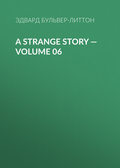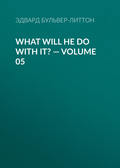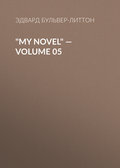
Эдвард Бульвер-Литтон
Falkland, Book 3
BOOK III
EXTRACTS FROM THE JOURNAL OF LADY EMILY MANDEVILLE
Friday.—Julia is here, and so kind! She has not mentioned his name, but she sighed so deeply when she saw my pale and sunken countenance, that I threw myself into her arms and cried like a child. We had no need of other explanation: those tears spoke at once my confession and my repentance. No letter from him for several days! Surely he is not ill! how miserable that thought makes me!
Saturday.—A note has just been brought me from him. He is come back-here! Good heavens! how very imprudent! I am so agitated that I can write no more.
Sunday.—I have seen him! Let me repeat that sentence—I have seen him. Oh that moment! did it not atone for all that I have suffered? I dare not write everything he said, but he wished me to fly with him—him—what happiness, yet what guilt, in the very thought! Oh! this foolish heart —would that it might break! I feel too well the sophistry of his arguments, and yet I cannot resist them. He seems to have thrown a spell over me, which precludes even the effort to escape.
Monday.—Mr. Mandeville has asked several people in the country to dine here to-morrow, and there is to be a ball in the evening. Falkland is of course invited. We shall meet then, and how? I have been so little accustomed to disguise my feelings, that I quite tremble to meet him with so many witnesses around. Mr. Mandeville has been so harsh to me to-day; if Falkland ever looked at me so, or ever said one such word, my heart would indeed break. What is it Alfieri says about the two demons to whom he is for ever a prey? "La mente e il cor in perpetua lite." Alas! at times I start from my reveries with such a keen sense of agony and shame! How, how am I fallen!
Tuesday.—He is to come here to-day and I shall see him!
Wednesday morning.—The night is over, thank Heaven! Falkland came late to dinner: every one else was assembled. How gracefully he entered! how superior he seemed to all the crowd that stood around him! He appeared as if he were resolved to exert powers which he had disdained before. He entered into the conversation, not only with such brilliancy, but with such a blandness and courtesy of manner! There was no scorn on his lip, no haughtiness on his forehead—nothing which showed him for a moment conscious of his immeasurable superiority over every one present. After dinner, as we retired, I caught his eyes. What volumes they told! and then I had to listen to his praises, and say nothing. I felt angry even in my pleasure. Who but I had a right to speak of him so well!
The ball came on: I felt languid and dispirited. Falkland did not dance. He sat: himself by me—he urged me to—O God! O God! would that I were dead!
FROM ERASMUS FALKLAND, ESQ., TO LADY EMILY MANDEVILLE
How are you this morning, my adored friend? You seemed pale and ill when we parted last night, and I shall be so unhappy till I hear something of you. Oh, Emily, when you listened to me with those tearful and downcast looks; when I saw your bosom heave at every word which I whispered in your ear; when, as I accidentally touched your hand, I felt it tremble beneath my own; oh! was there nothing in those moments at your heart which pleaded for me more eloquently than words? Pure and holy as you are, you know not, it is true, the feelings which burn and madden in me. When you are beside me, your hand, if it trembles, is not on fire, your voice, if it is more subdued, does not falter with the emotions it dares not express: your heart is not like mine, devoured by a parching and wasting flame: your sleep is not turned by restless and turbulent dreams from the healthful renewal, into the very consumer, of life. No, Emily! God forbid that you should feel the guilt, the agony which preys upon me; but, at least, in the fond and gentle tenderness of your heart, there must be a voice you find it difficult to silence. Amidst all the fictitious ties and fascinations of art, you cannot dismiss from your bosom the unconquerable impulse of nature. What is it you fear?—you will answer, disgrace! But can you feel it, Emily, when you share it with me? Believe me that the love which is nursed through shame and sorrow is of a deeper and holier nature than that which is reared in pride, fostered in joy. But, if not shame, it is guilt, perhaps, which you dread? Are you then so innocent now? The adultery of the heart is no less a crime than that of the deed; and—yet I will not deceive you— it is guilt to which I tempt you!—it is a fall from the proud eminence you hold now. I grant this, and I offer you nothing in recompense but my love. If you loved like me, you would feel that it was something of pride—of triumph—to dare all things, even crime, for the one to whom all things are as nought! As for me, I know that if a voice from Heaven told me to desert you, I would only clasp you the closer to my heart!
I tell you, my own love, that when your hand is in mine, when your head rests upon my bosom, when those soft and thrilling eyes shall be fixed upon my own, when every sigh shall be mingled with my breath, and every tear be kissed away at the very instant it rises from its source—I tell you that then you shall only feel that every pang of the past, and every fear for the future, shall be but a new link to bind us the firmer to each other. Emily, my life, my love, you cannot, if you would, desert me. Who can separate the waters which are once united, or divide the hearts which have met and mingled into one?
Since they had once more met, it will be perceived that Falkland had adopted a new tone in expressing his passion to Emily. In the book of guilt another page, branded in a deeper and more burning character, had been turned. He lost no opportunity of summoning the earthlier emotions to the support of his cause. He wooed her fancy with the golden language of poetry, and strove to arouse the latent feelings of her sex by the soft magic of his voice, and the passionate meaning it conveyed. But at times there came over him a deep and keen sentiment of remorse; and even, as his experienced and practised eye saw the moment of his triumph approach, he felt that the success he was hazarding his own soul and hers to obtain, might bring him a momentary transport, but not a permanent happiness. There is always this difference in the love of women and of men; that in the former, when once admitted, it engrosses all the sources of thought, and excludes every object but itself; but in the latter, it is shared with all the former reflections and feelings which the past yet bequeaths us, and can neither (however powerful be its nature) constitute the whole of our happiness or woe. The love of man in his maturer years is not indeed so much a new emotion, as a revival and concentration of all his departed affections to others; and the deep and intense nature of Falkland's passion for Emily was linked with the recollections of whatever he had formerly cherished as tender or dear; it touched— it awoke a long chain of young and enthusiastic feelings, which arose, perhaps, the fresher from their slumber. Who, when he turns to recall his first and fondest associations; when he throws off, one by one, the layers of earth and stone which have grown and hardened over the records of the past: who has not been surprised to discover how fresh and unimpaired those buried treasures rise again upon his heart? They have been laid up in the storehouse of Time; they have not perished; their very concealment has preserved them! We remove the lava, and the world of a gone day is before us!







